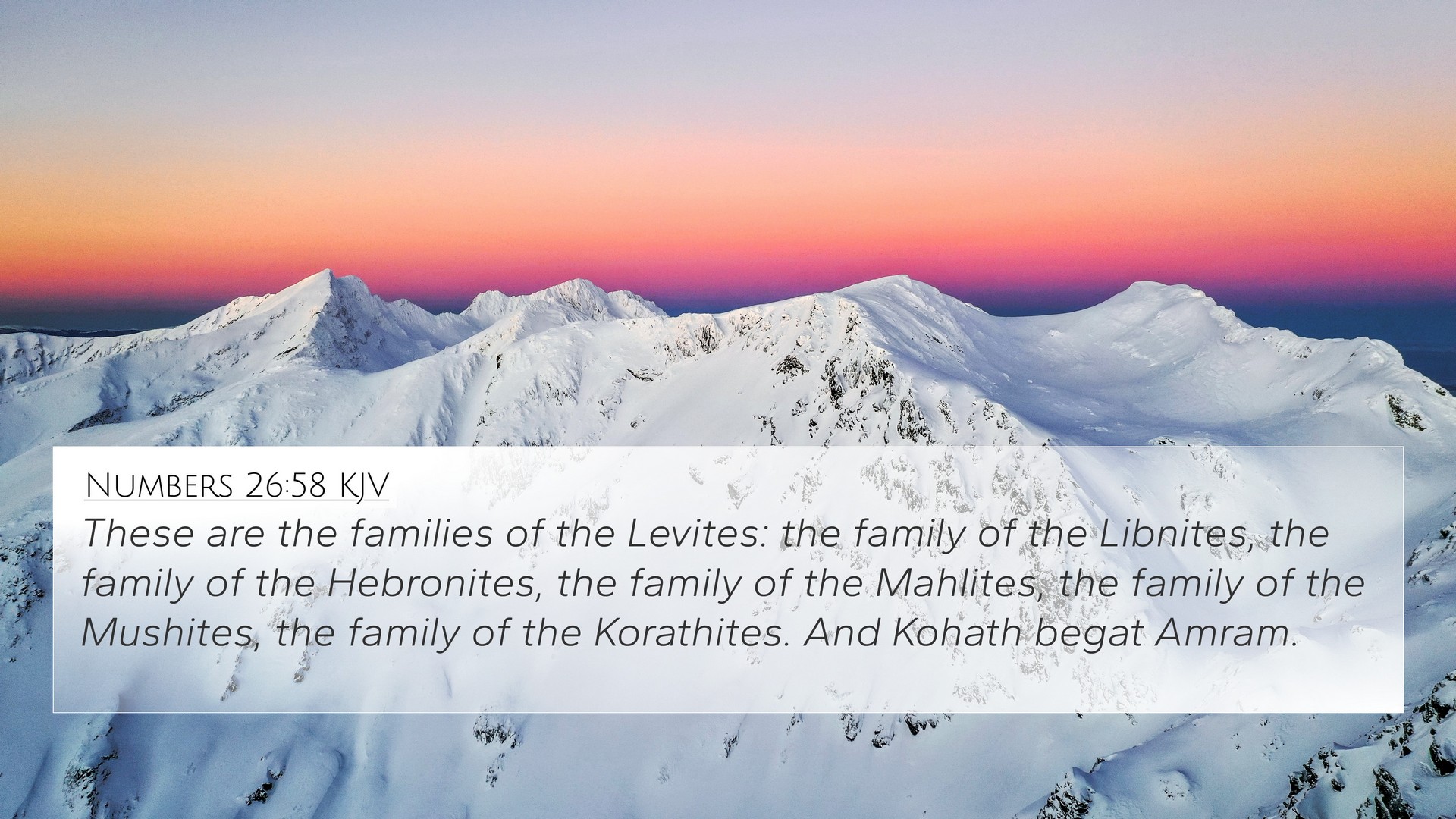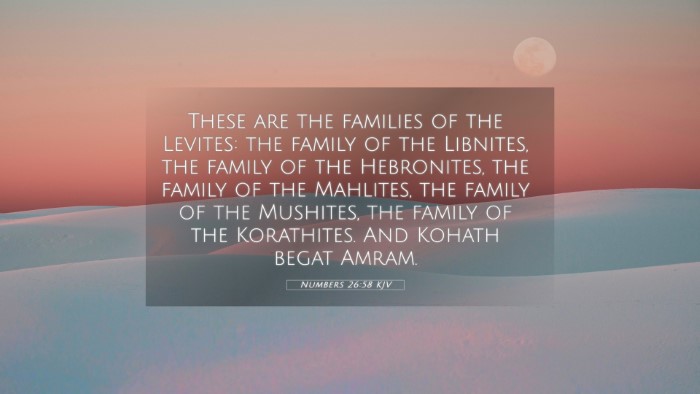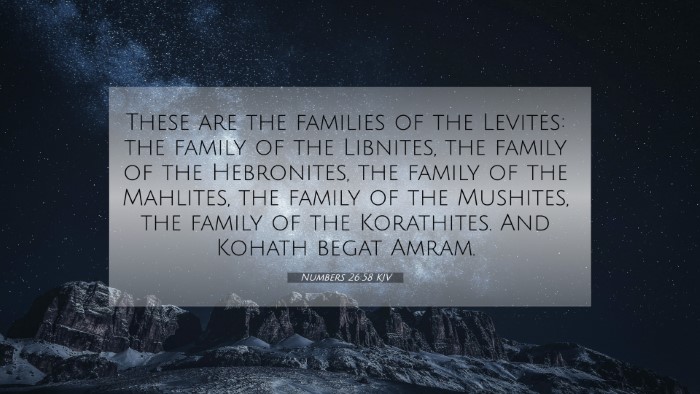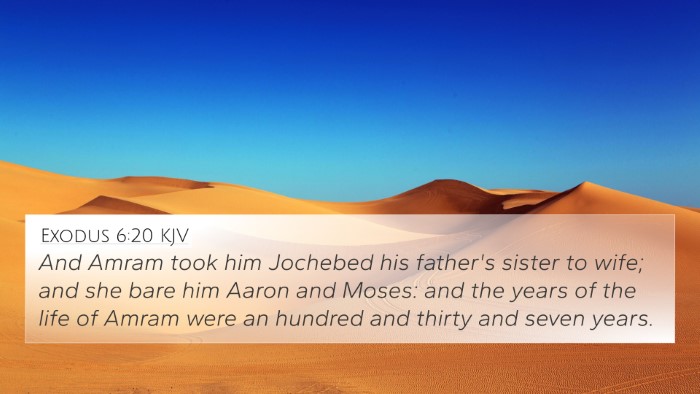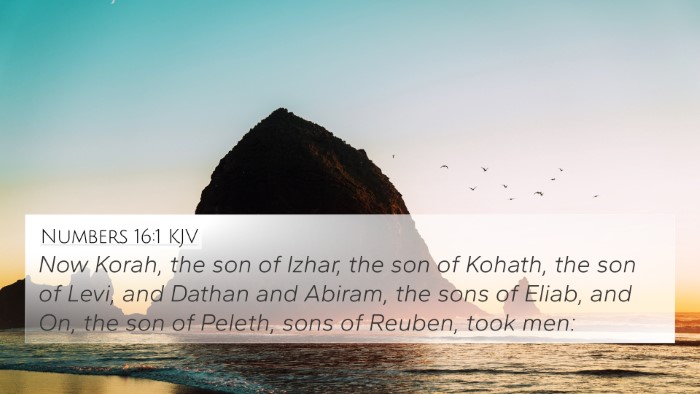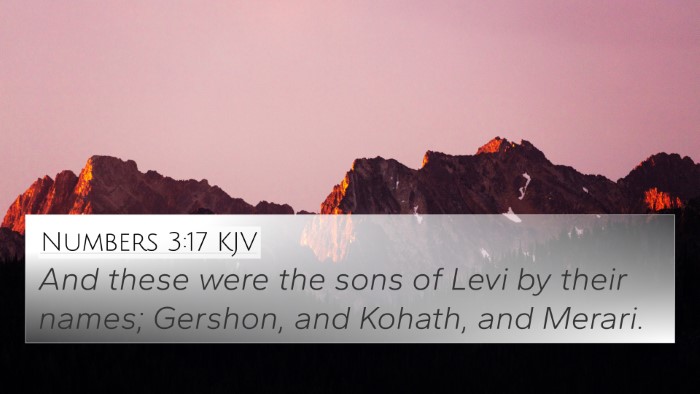Understanding Numbers 26:58
Numbers 26:58 states: “These are the families of the Levites: the family of the Libnites, the family of the Hebronites, the family of the Mahlites, the family of the Mushites, the family of the Korahites. And Kohath was the father of Amram.” This verse pulls back the curtain on the genealogical structure of the Levites, detailing their family lines and heritage. In this summary, we will explore its meaning and connections using insights from respected public domain commentaries.
Genealogical Significance
Matthew Henry emphasizes the importance of genealogies in Scripture as they establish the identity and role of the tribes and families within Israel. In the case of the Levites, their lineage is crucial for understanding their priestly duties.
Albert Barnes points out that the Levites were set apart for service in the tabernacle and later the temple. The distinctions among the various families demonstrate the organized structure that God established for worship. This careful ordering highlights the significance of holy service in the life of Israel.
Adam Clarke remarks on the specific mention of Kohath's descendants, underscoring that the Levites' roles were not just about lineage but involved specific responsibilities tied to worship and the presence of God among His people.
Thematic Connections
The Levites' structure delineated in Numbers 26:58 serves as a historical context that connects to various themes throughout the Bible. Below are notable connections this verse has with other scriptures:
- Exodus 6:16-20 - This passage outlines the genealogy of Moses, connecting him with the Levite lineage and establishing the foundation for his leadership in delivering Israel from Egypt.
- Leviticus 10:1-3 - Here, we see the specifics of priestly duties and the severe consequences of not adhering to God's commands, emphasizing the Levites' role in maintaining holiness.
- 1 Chronicles 5:29-31 - A parallel genealogy that enriches our understanding of the Levite families and their places in Israelite history.
- Hebrews 7:11-14 - The New Testament references the Levitical priesthood, illustrating its transition with Christ as the ultimate high priest.
- Joshua 21:1-3 - The Levites are given cities to dwell in, highlighting their integral role in the land of promise and as spiritual leaders.
- Deuteronomy 10:8-9 - This Scripture further establishes the Levites' distinct role among God’s people, emphasizing their service.
- Psalm 78:68-71 - Here, the psalmist reflects on God’s choice of the tribe of Levi to shepherd His people, shedding light on God’s purpose for them.
Cross-Referencing Biblical Texts
This verse's genealogical context can help readers understand the broader framework of God's chosen people, and how different families serve varying roles within His plan. The connections between Bible verses strengthen our understanding of God's covenant and faithfulness across time.
To better analyze such connections, tools like a Bible Concordance or a Bible Cross-reference Guide can be invaluable. They assist in locating similar themes and cross-references, enriching our Bible study and inviting deeper theological exploration.
Reflection and Application
In reflecting on Numbers 26:58, we can apply the underlying message of God’s order and structure in our own lives. The families of the Levites illustrate the diverse yet unified body of Christ, where every member plays a unique role within God’s kingdom. Understanding our specific calling, much like the Levites, allows us to engage in holy service in our communities and churches.
This verse also encourages us to delve into the concept of linking Bible scriptures. Developing a habit of scriptural cross-referencing can reveal deeper insights into the word of God and how various themes interconnect, enriching one's spiritual journey.
Conclusion
Numbers 26:58 serves as a vital reminder of the structured nature of God's divine order in worship and service. By uncovering the genealogical significance and thematic connections, believers can appreciate the continuity and faithfulness of God's promise from the Old Testament into the New.
As we continue to explore the Bible, utilizing comprehensive Bible cross-reference materials can illuminate the rich tapestry of God’s story, encouraging both personal growth and a foundational understanding of His word.
